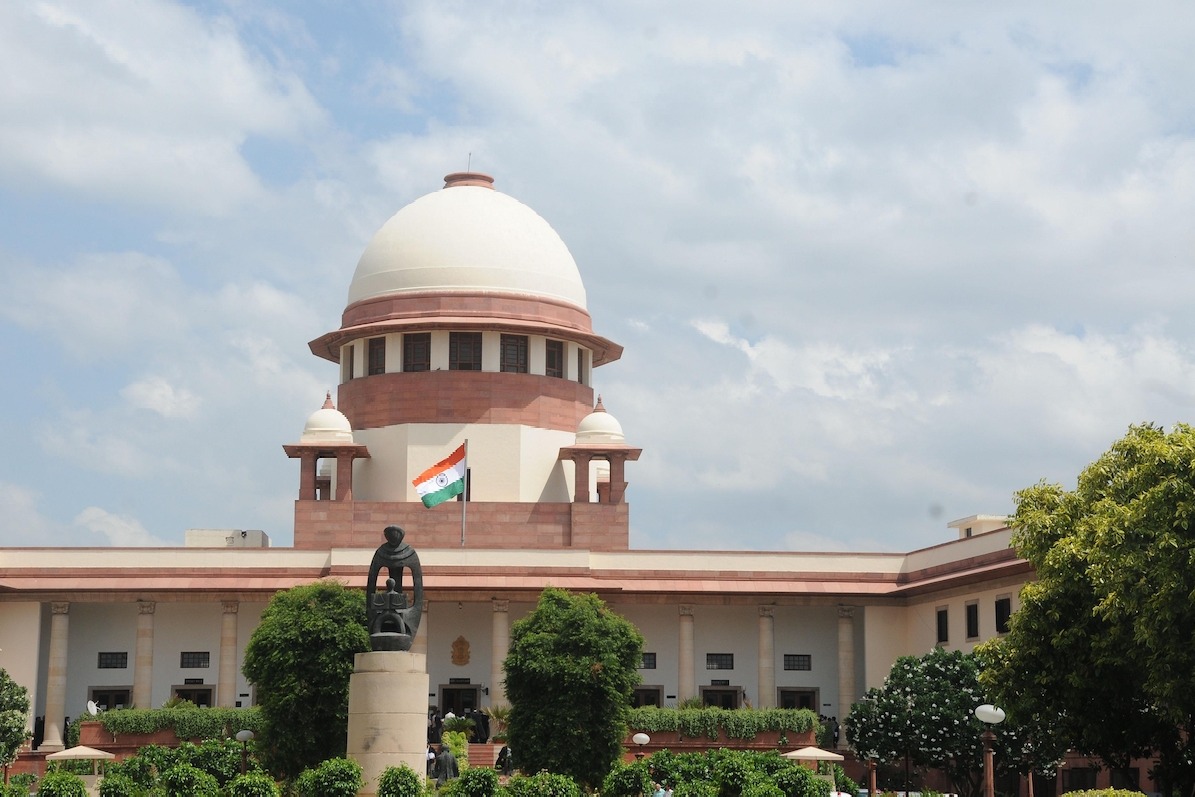SC proposes keeping sedition law in abeyance till review, seeks Centre's response

New Delhi, May 10 : The Supreme Court on Tuesday gave 24 hours to the Centre to consider, whether the operation of the sedition provision, Section 124A of the Indian Penal Code, could be kept in abeyance till the process of its review is over.
A bench, headed by Chief Justice N.V. Ramana told Solicitor General Tushar Mehta: "We will give you time till tomorrow morning to take instructions from the government."
The bench, also comprising Justices Surya Kant and Hima Kohli, emphasized that its main concern is pending cases, and how the government will take care of future cases.
"Section 124A, as well as future cases, can be kept in abeyance till reconsideration takes place," said the bench, asking Mehta to come back to it on Wednesday after taking instructions from the government.
The bench observed: "The question is at the ground level, the police and authorities (are using the law). Can a direction be issued, we are re-examining, do not use Section 124A?"
The Chief Justice told Mehta the court is giving time till Wednesday to take instructions on what will happen in pending cases, and how will the government take care of future cases. "The main contention, meanwhile, is to protect the interest of people," noted the bench.
In an affidavit, the Ministry of Home Affairs has told the Supreme Court that in spirit of Azadi Ka Amrit Mahotsav and the Prime Minister's unequivocal views in favour of protection of civil liberties and to shed colonial baggage, the government has decided to re-examine and re-consider the sedition law.
Senior advocate Kapil Sibal, representing one of the petitioners, contended that the exercise of the top court cannot be stopped merely because the legislature will take time to reconsider. He added that it was for the judiciary to examine the constitutionality of the law.
At this, the bench queried Mehta: "How long will you take for reconsideration."
As the petitioners' lawyer objected to Centre's affidavit, the bench clarified that it is keeping the matter pending and not disposing of.
Citing the Home Ministry's affidavit, the Chief Justice said it says the Prime Minister is cognisant and has often spoken about civil liberties and human rights and diversity of thoughts, and also outdated laws being scrapped.
"They say, they are examining... we should not appear unreasonable," noted the bench. However, it queried Mehta how will the government protect the people, and pointed out at people against whom cases are pending.
As Mehta said FIRs under the sedition law were lodged by the state governments, not the Centre, the bench said: "Why don't you issue a directive (to states) to keep the matter in abeyance?"
Mehta replied: "We cannot say what will happen in future.... There has been no history where a penal law has been prevented from being used." He cited judgments where the apex court advised the government not to be trigger happy about sedition FIRs.
However, Justice Kohli persisted: "Why can't Centre issue a communication to states?"
The bench also queried: "Can someone stay in jail for months? Your affidavit says civil libertiesa... How will you protect those liberties?"
Senior advocate Gopal Sankaranarayan, representing one of the petitioners, said it was becoming a "pattern" with the government to seek more time to delay important cases.
The bench, citing Attorney General K.K. Venugopal's submissions on the misuse of sedition law over the recitation of 'Hanuman Chalisa', added that modification of law takes time, and in the meanwhile, the Centre can issue a directive to states to keep the sedition law in abeyance.
The MHA, in its affidavit, said the Prime Minister has been cognizant of various views expressed on the subject and has also periodically, in various forums, expressed his clear and unequivocal views in favour of protection of civil liberties, respect for human rights, and giving to the constitutionally cherished freedoms to the people of the country.
It added that the PM has repeatedly said that one of India's strengths is the diverse thought streams that beautifully flourish in the country, and the PM believes that at a time when the nation is marking Azadi Ka Amrit Mahotsav (75 years of Independence), as a nation, it is essential to work harder to shed colonial baggage that passed its utility, which includes outdated colonial laws and practices.
"The government of India, being fully cognisant of various views being expressed on the subject of sedition and also having considered the concerns of civil liberties and human rights, while committed to maintain and protect the sovereignty and integrity of this nation, has decided to re-examine and re-consider the provisions of Section 124A of the Indian Penal Code, which can only be done before the competent forum," said the affidavit.
The top court was hearing arguments on whether a reference to a larger bench is required, as in Kedar Nath Singh judgment (1962), a five-judge bench had retained the section after reading it down.
The top court is hearing petitions filed by Major General S.G. Vombatkere (retd) and the Editors Guild of India and others, challenging the constitutional validity of Section 124A which carries a maximum penalty of life imprisonment.
A bench, headed by Chief Justice N.V. Ramana told Solicitor General Tushar Mehta: "We will give you time till tomorrow morning to take instructions from the government."
The bench, also comprising Justices Surya Kant and Hima Kohli, emphasized that its main concern is pending cases, and how the government will take care of future cases.
"Section 124A, as well as future cases, can be kept in abeyance till reconsideration takes place," said the bench, asking Mehta to come back to it on Wednesday after taking instructions from the government.
The bench observed: "The question is at the ground level, the police and authorities (are using the law). Can a direction be issued, we are re-examining, do not use Section 124A?"
The Chief Justice told Mehta the court is giving time till Wednesday to take instructions on what will happen in pending cases, and how will the government take care of future cases. "The main contention, meanwhile, is to protect the interest of people," noted the bench.
In an affidavit, the Ministry of Home Affairs has told the Supreme Court that in spirit of Azadi Ka Amrit Mahotsav and the Prime Minister's unequivocal views in favour of protection of civil liberties and to shed colonial baggage, the government has decided to re-examine and re-consider the sedition law.
Senior advocate Kapil Sibal, representing one of the petitioners, contended that the exercise of the top court cannot be stopped merely because the legislature will take time to reconsider. He added that it was for the judiciary to examine the constitutionality of the law.
At this, the bench queried Mehta: "How long will you take for reconsideration."
As the petitioners' lawyer objected to Centre's affidavit, the bench clarified that it is keeping the matter pending and not disposing of.
Citing the Home Ministry's affidavit, the Chief Justice said it says the Prime Minister is cognisant and has often spoken about civil liberties and human rights and diversity of thoughts, and also outdated laws being scrapped.
"They say, they are examining... we should not appear unreasonable," noted the bench. However, it queried Mehta how will the government protect the people, and pointed out at people against whom cases are pending.
As Mehta said FIRs under the sedition law were lodged by the state governments, not the Centre, the bench said: "Why don't you issue a directive (to states) to keep the matter in abeyance?"
Mehta replied: "We cannot say what will happen in future.... There has been no history where a penal law has been prevented from being used." He cited judgments where the apex court advised the government not to be trigger happy about sedition FIRs.
However, Justice Kohli persisted: "Why can't Centre issue a communication to states?"
The bench also queried: "Can someone stay in jail for months? Your affidavit says civil libertiesa... How will you protect those liberties?"
Senior advocate Gopal Sankaranarayan, representing one of the petitioners, said it was becoming a "pattern" with the government to seek more time to delay important cases.
The bench, citing Attorney General K.K. Venugopal's submissions on the misuse of sedition law over the recitation of 'Hanuman Chalisa', added that modification of law takes time, and in the meanwhile, the Centre can issue a directive to states to keep the sedition law in abeyance.
The MHA, in its affidavit, said the Prime Minister has been cognizant of various views expressed on the subject and has also periodically, in various forums, expressed his clear and unequivocal views in favour of protection of civil liberties, respect for human rights, and giving to the constitutionally cherished freedoms to the people of the country.
It added that the PM has repeatedly said that one of India's strengths is the diverse thought streams that beautifully flourish in the country, and the PM believes that at a time when the nation is marking Azadi Ka Amrit Mahotsav (75 years of Independence), as a nation, it is essential to work harder to shed colonial baggage that passed its utility, which includes outdated colonial laws and practices.
"The government of India, being fully cognisant of various views being expressed on the subject of sedition and also having considered the concerns of civil liberties and human rights, while committed to maintain and protect the sovereignty and integrity of this nation, has decided to re-examine and re-consider the provisions of Section 124A of the Indian Penal Code, which can only be done before the competent forum," said the affidavit.
The top court was hearing arguments on whether a reference to a larger bench is required, as in Kedar Nath Singh judgment (1962), a five-judge bench had retained the section after reading it down.
The top court is hearing petitions filed by Major General S.G. Vombatkere (retd) and the Editors Guild of India and others, challenging the constitutional validity of Section 124A which carries a maximum penalty of life imprisonment.

